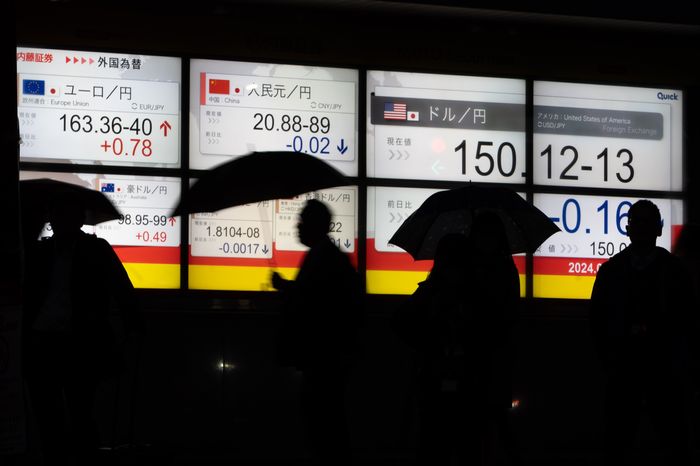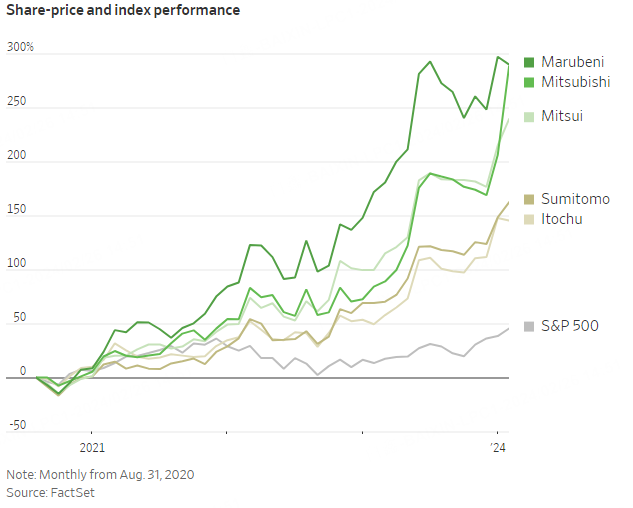Warren Buffett was into Japanese stocks before their recent comeback.
Buffett's company, Berkshire Hathaway, revealed in August 2020 that it had built stakes of about 5% in five Japanese trading companies. Berkshire has since added to its positions in Itochu, Marubeni, Mitsubishi, Mitsui and Sumitomo, themselves conglomerates with wide ranges of businesses and investments.
The Japanese stocks have been good bets for Berkshire. Their returns, including dividends, have dwarfed those of the S&P 500 and Japan's Nikkei 225 stock average.
Since the market's close on Aug. 28, 2020, before Berkshire announced its investments, the S&P 500 has returned 53%, according to FactSet. The returns in yen of the five companies, by contrast, range from a low of 185% for Itochu to a high of 402% for Marubeni.
Buffett said in his annual letter to shareholders Saturday that Berkshire now owns about 9% of each. Berkshire's unrealized gain from the five was $8 billion at the end of 2023, he wrote.
"He's made a fortune in those names," said Eric Lynch, a managing director and portfolio manager at Scharf Investments. "They've wildly exceeded the S&P 500."
Berkshire said in 2020 it had yen-denominated debt that would leave it with only minor exposure to fluctuations in the yen-dollar exchange rate. The Omaha, Neb., company said it had acquired its holdings over about 12 months through regular purchases on the Tokyo Stock Exchange.
Buffett wrote in his letter Saturday that Berkshire began buying the Japanese stocks on July 4, 2019.
"Given Berkshire's present size, building positions through open-market purchases takes a lot of patience and an extended period of 'friendly' prices," he said. "The process is like turning a battleship."
Buffett said the companies follow shareholder-friendly policies, reducing their numbers of outstanding shares at attractive prices and using retained earnings to build their businesses.
"An additional benefit for Berkshire is the possibility that our investment may lead to opportunities for us to partner around the world with five large, well-managed and well-respected companies," he said.
The Japanese stock market was long mired in the doldrums. When Berkshire announced its investments, the Nikkei 225 was trading around 40% below its record close from Dec. 29, 1989.

Back then, a bubble in Japan's real-estate and financial markets gave way to a period that became known as the country's lost decades. Japan's aging population slowed productivity while driving up the costs of pensions and healthcare.
Now, Japan's stock market is back. Last week, it hit its first record in 34 years, propelled higher by corporate profits that are projected to be roughly triple those of a decade ago. Japanese companies have shed underperforming units and taken advantage of global inflation to raise prices.
When Berkshire first disclosed its investments, four of the five stocks were trading far off closing records set in 2007 and 2008. (Itochu shares, by contrast, had notched a record earlier in 2020 and set another the day of the Aug. 31 announcement.)
Berkshire's shares of the five companies were valued at $23 billion on Thursday, according to FactSet.
At Berkshire's most recent annual meeting in May, Buffett spoke of the earnings and dividend payments of the Japanese companies, as well as Berkshire's familiarity with them.
"Here were five very, very substantial companies, understandable companies," he said. "We'd seen them operate and everything. There wasn't anything to it. And at the same time, we could take out the currency risk by financing."
Buffett and Greg Abel, who heads Berkshire's noninsurance businesses and is in line to succeed Buffett as chief executive, traveled to Japan last year and met with the chief executives of the five companies. In June, Berkshire said that it had increased its ownership stake in the companies and that Buffett and Abel hoped to eventually own 9.9% of each.
Buffett has said Berkshire won't acquire more than 9.9% of any of the companies without approval from its board.

Comments